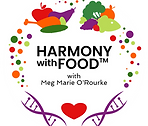Food Allergies, Sensitivities, and Intolerances Explained
In this week's show, I'm talking about the importance of personalized nutrition, my 5 pillars of health, and the difference between food intolerances, allergies, and sensitivities.
Personalized Nutrition
Personalized nutrition is forecasted to be a $64 billion industry by 2040. Big name companies like Apple, Uber, and Amazon could benefit from this massive opportunity. For example, health data and the apple watch could be combined with genetic information to offer personalized nutrition.
We're seeing heightened health awareness among consumers, but more people are suffering from ailments that are attributed to poor nutrition. So, there's a growing demand for solutions that can improve nutritional choices.
There are so many things that could be related to nutrition or that nutrition could help, including autoimmune disorders, inflammatory bowel disease, Celiac disease, metabolic issues, cardiovascular disease, diabetes, liver, gallbladder, or neurological issues, small intestinal overgrowth, and weight loss resistance.
Food can also affect your mood and cause things like chronic fatigue, sluggishness, brain fog, skin rashes, eczema, psoriasis, migraines, itchy skin, cramps, bloating, nausea, diarrhea, gas, diarrhea, indigestion, joint pain, leaky gut syndrome, nutritional deficiencies, and gastroesophageal reflux disease (GERD).
When we look at the relationship between symptoms and underlying biological pathways, we can determine exactly what you need to do to improve your health and start feeling better. This is what I do in my Biounique Boutique.
I've helped thousands of people at this point in my career, and I've discovered some interesting and important information that can help you too. I tend to see tough cases in my nutrition practice and people who have tried many things but haven't found something that works for them. So we need to dig deeper and find out exactly what is going on with their system.

5 Pillars to Health
Through all of the clients I have worked with, I have found that there are 5 pillars that keep people from getting the results they need I'm going to walk you through them and how to avoid them.
#1: Understand Chronic Conditions
The first thing I see is that people don't understand chronic conditions well. I try to empower my clients with the nutrition, knowledge, and tools they need to work with their chronic conditions and help them understand what can happen when they don't take care of themselves.
#2: Determine Bio Individuality
By learning to identify specific underlying factors like health history, environmental triggers, chronic conditions, and symptoms we can figure out exactly what is causing your problems.
#3: Evaluate How Foods Affect Your Biochemistry
The third thing you need to do is learn how foods and the compounds inside of them affect your body. No everyone has the same symptoms or the same foods that they are sensitive to. I find food sensitivities through a test that looks at things like night shades, yeast containing foods, lectins, gluten, and more.
#4: Master Therapeutic Diets
When you understand the intricacies of each therapeutic diet, how to use them, and practical tips from me, you'll feel confident and you'll be able to do your diet in a way that you've never done it before.
#5: Elimination Diets
I hate elimination diets. Nutritionists prescribe an elimination diet to find out which foods you're sensitive to. So you'll try and avoid dairy for a while, then add it back, try to avoid wheat for a while, then add it back, etc. etc. for all of the food groups you may be sensitive to. This can take a long time to do, and it isn't always successful because you may have different reactions to different foods and you may miss those reactions.
That's why I say test don't guess and rely on the tests in my Biounique Boutique to help me figure these things out. That testing will help me determine which foods will work for you right away, so you don't have to spend months guessing at it.
Food Intolerance vs. Food Sensitivity vs. Food Allergy
A common question I get is what the difference is between food sensitivities, allergies, and intolerances.
Food allergies can be very serious and even lead to death. They aren't something we want to mess with at all and can be found through testing with your allergist. These are also called type one hypersensitivities.
Food sensitivities are also called Non-IgE reactions, or type two, three, or four hypersensitivities. With food sensitivities, food protein antigens will bind to antibodies and form an immune complex, which can evoke a systemic food response. Symptoms of food sensitivities are often delayed and hard to pinpoint or detect, which is why I don't like doing elimination diets to identify them.
Food intolerances are if you are lacking a certain enzyme like lactase, you're going to have a lactose intolerance and be unable to tolerate dairy products. They may make you sick and give you GI distress or other symptoms. We all respond a little differently.
Episode Transcript

.png)




















Commenti